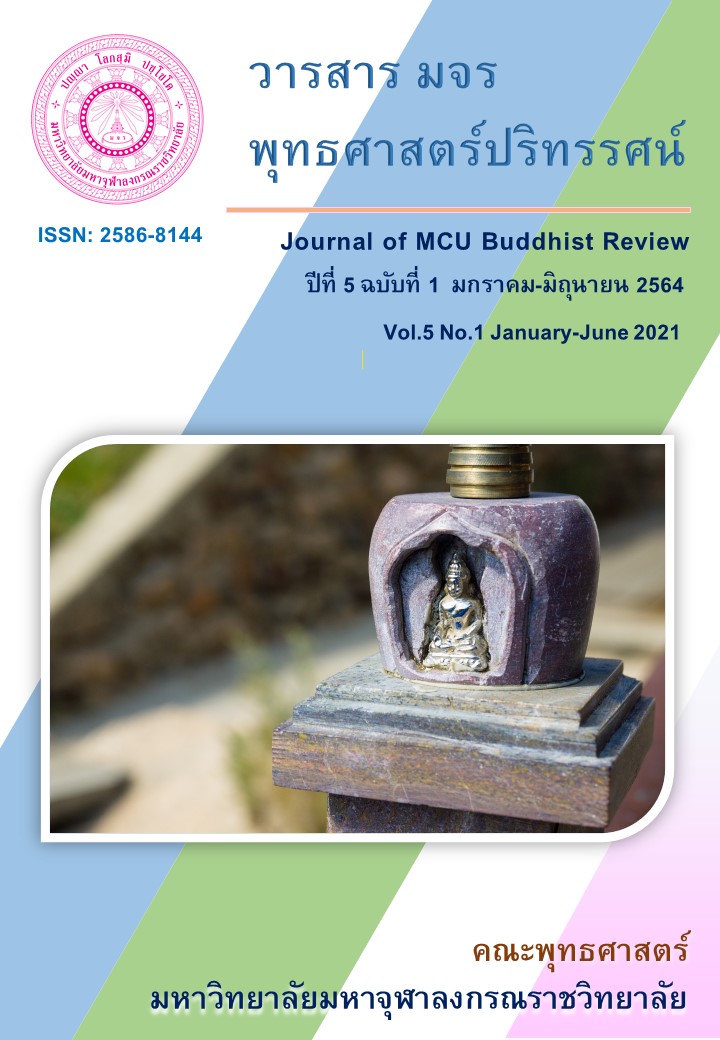มโนทัศน์เรื่องสิทธิเสรีภาพในพระพุทธศาสนาเถรวาท
Main Article Content
บทคัดย่อ
บทความนี้มีวัตถุประสงค์เพื่อศึกษาแนวคิดเรื่องสิทธิและเสรีภาพ และวิเคราะห์สิทธิและเสรีภาพในพระพุทธศาสนา จากการศึกษาพบว่า สิทธิและเสรีภาพเป็นแนวคิดทางด้านสังคมและการเมืองที่ถูกเสนอผ่านข้อเสนอทางอภิปรัชญาที่พิจารณาถึงเสรีภาพทางธรรมชาตินั้นมาจากใจที่ไม่ถูกผูกมัดด้วยเงื่อนไขอื่นใด ข้อเสนอทางด้านสังคมจะพิจารณาถึงสิทธิและอำนาจทางสังคมที่จะกำหนดมนุษย์ไม่สามารถใช้เสรีภาพได้เพื่อรักษาประโยชน์ที่ทุกคนจะได้รับไว้ด้วยกัน เป็นการกำหนดการกระทำที่เป็นรูปธรรมรวมถึงพิจารณาถึงการได้รับสิทธิทางกฎหมายที่เท่าเทียมและยุติธรรมกันเป็นเครื่องตอบแทน
ส่วนสิทธิและเสรีภาพในพระพุทธศาสนาเถรวาทถูกเสนอผ่านข้อเสนอทางด้านอภิปรัชญาที่พิจารณาถึงเรื่องเสรีภาพในแง่ของกรรมนิยามที่ปัจเจกบุคคลสามารถทำทุกอย่างได้ หากปัจเจกบุคคลนั้นมีเจตนาที่บริสุทธิ์ก็ไม่จำเป็นต้องคำนึงถึงผลที่ตามมา ขณะเดียวกันพระพุทธศาสนาเถรวาทก็อ้างถึงความรับผิดชอบถึงผลที่เกิดขึ้น โดยผลนั้นจะกระทบถึงจิตใจของปัจเจกบุคคลนั้นเป็นหลักในทุกการกระทำที่ส่งผลต่อเนื่องกันไปตามกรรมนิยาม และข้อเสนอทางด้านสังคมที่พิจารณาเรื่องสิทธิทางธรรมชาติที่มนุษย์จะเป็นเจ้าของชีวิตของตนเองรวมถึงทรัพย์สินของตนเอง รวมถึงสิทธิของสตรีกับบุรุษที่แตกต่างกันนั้นมาจากการยอมรับทางด้านสมมติสัจจะ เป็นวิธีที่พระพุทธศาสนาเถรวาทยอมรับว่าความจริงทั้งแบบปรมัตถสัจจะและสมมติสัจจะว่าเป็นจริงเสมอกัน
Article Details
- บทความที่ได้รับการตีพิมพ์เป็นลิขสิทธิ์ของวารสาร มจร พุทธศาสตร์ปริทรรศน์
- ข้อความใดๆ ที่ปรากฎในบทความที่ได้รับการตีพิมพ์ในวารสาร ถือเป็นความรับผิดชอบของผู้เขียนบทความ และข้อคิดเห็นนั้นไม่ถือว่าเป็นทัศนะและความรับผิดชอบของกองบรรณาธิการวารสาร มจร พุทธศาสตร์ปริทรรศน์
เอกสารอ้างอิง
ฌอง ฌาคส์ รุสโซ. (2563). สัญญาประชาคม หรือ หลักแห่งสิทธิทางการเมือง. แปลโดย สมบูรณ์ ศุภศิลป์. กรุงเทพมหานคร: ทับหนังสือ.
พระพรหมคุณาภรณ์ (ป.อ.ปยุตฺโต). (2557). ประชาธิปไตยจริงแท้ คือแค่ไหน. พิมพ์ครั้งที่ 6. กรุงเทพมหานคร: สำนักพิมพ์ผลิธัมม์.
มหาจุฬาลงกรณราชวิทยาลัย. (2539). พระไตรปิฎกภาษาไทย ฉบับมหาจุฬาลงกรณราชวิทยาลัย. กรุงเทพมหานคร : โรงพิมพ์มหาจุฬาลงกรณราชวิทยาลัย.
มิลเลอร์ เดวิด. (2560). ปรัชญาการเมือง: ความรู้ฉบับพกพา. แปลโดย เกษียร เตชะพีระ. กรุงเทพมหานคร: โอเพ่นเวิลด์ส.
สมภาร พรมทา. (2548). พุทธปรัชญา: มนุษย์ สังคม และปัญหาจริยธรรม. พิมพ์ครั้งที่ 2. กรุงเทพมหานคร: ศยาม.
วรเจตน์ ภาคีรัตน์. (2561). ประวัติศาสตร์ความคิดนิติปรัชญา. กรุงเทพมหานคร: โรงพิมพ์ภาพพิมพ์.
รัฐธรรมนูญแห่งราชอาณาจักรไทย พ.ศ. 2560. (2560, 6 เมษายน). ราชกิจจานุเบกษา. เล่ม 134 ตอนที่ 40 ก, หน้า 1.
เฮนรี่ เดวิด ธอโร. (2563). ต้านอำนาจรัฐและความเรียงสามชิ้น. พิมพ์ครั้งที่ 2. แปลโดย พจนา จันทรสันติ. นนทบุรี: ภาพพิมพ์.
John Stuart Mill. (2530). On Liberty ความเรียงว่าด้วยเสรีภาพ. แปลโดย ภัทรพร สิริกาญจน. กรุงเทพมหานคร: สำนักคณะกรรมการวิจัยแห่งชาติ (วช.).
Austin Flannery. (1982). Vatican Council II, vol. II. Collegeville: The Liturgical press.
John K.Roth and Frederick Sontag. (1988). The Questions of Philosophy. California: Wadsworth Publishing.
Peter Harvey. (2000). An Introduction to Buddhist Ethics. Cambridge: Cambridge University Press.


